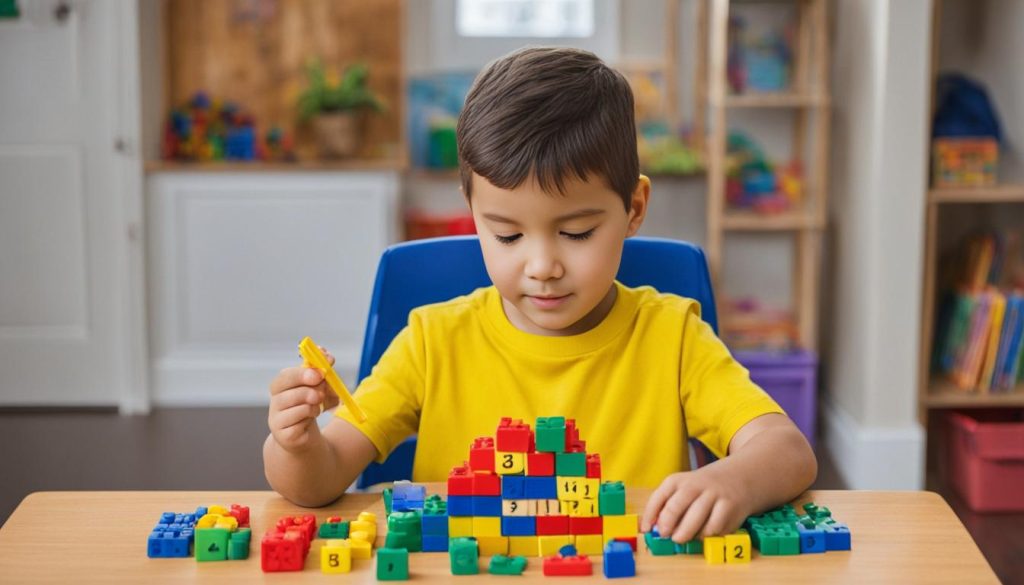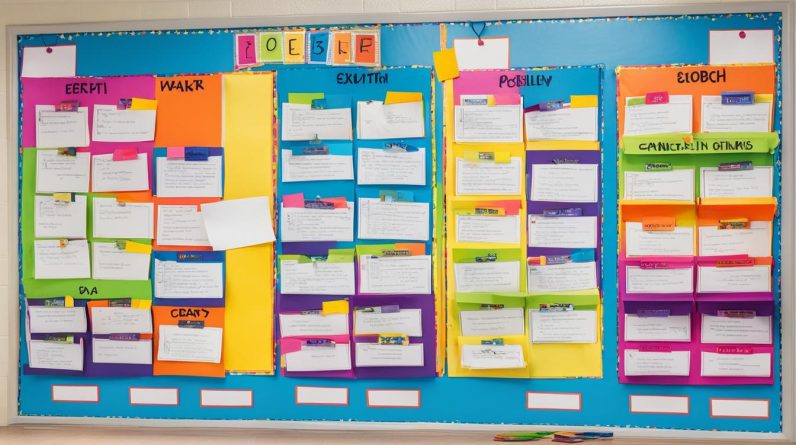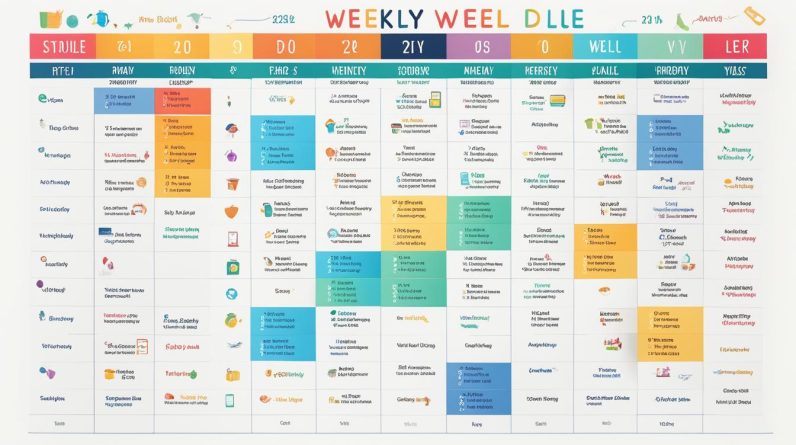Embark on an enriching home school kindergarten experience with expert tips on curriculums, resources, and successful homeschooling strategies. In this article, we will guide you through the process of kickstarting your home school kindergarten journey. We will provide you with valuable information on creating a homeschooling schedule, researching homeschool requirements, setting goals, choosing a curriculum, and more. Whether you are a first-time homeschooler or looking to enhance your current homeschooling experience, this article is filled with practical advice to help you make the most of your home school kindergarten journey.
Key Takeaways:
- Research homeschool requirements in your state to ensure compliance with the law.
- Set broad and specific measurable goals for your kindergartener’s education.
- Choose a curriculum that aligns with your child’s learning style and interests.
- Create a flexible homeschool schedule that balances academic work and hands-on activities.
- Incorporate reading, language arts, math, and enrichment activities into your homeschooling routine.
Researching Homeschool Requirements
Before you begin homeschooling your kindergartener, it is crucial to research the homeschool requirements in your state. Each state has its own set of rules and regulations regarding homeschooling, so it’s essential to familiarize yourself with these guidelines to ensure compliance with the law.
Researching homeschool requirements allows you to understand the legal obligations and obligations that you need to adhere to as a homeschooling parent. It provides you with clarity and guidance on what is expected of you and how to meet those requirements to provide a quality education for your child.
To find information on homeschool laws by state, you can explore various resources that provide comprehensive details on the legal framework governing homeschooling. One such resource is The North Carolina Homeschool Guide Book created by North Carolina’s Division of Non-Public Education and the Coalition for Responsible Home Education.
In addition to state-specific resources, you can consult local homeschooling associations or organizations to gain insights into the homeschooling guidelines and regulations in your area.
By researching homeschool requirements, you can ensure that you are fulfilling all necessary obligations and providing your kindergartener with a legal and enriching homeschool education. It also helps you establish a strong foundation for your homeschooling journey and sets you up for success.
Understanding the Importance of Homeschool Requirements
Researching homeschool requirements is the first step towards creating a successful homeschooling environment for your kindergartener.
Homeschool requirements serve as guidelines to ensure that homeschooled children receive a quality education that meets minimum standards set by the state. These requirements are in place to protect the educational rights of children and maintain accountability within the homeschooling community.
By understanding and adhering to homeschool requirements, you not only ensure compliance with the law but also demonstrate your commitment to providing your child with a well-rounded education. It can also help you stay informed about any changes or updates in the homeschooling laws that may affect your homeschooling journey.
Setting Goals and Homeschooling Successfully
Once you have familiarized yourself with the homeschooling requirements, it is essential to set goals for your kindergartener’s homeschooling journey. Clearly defined goals help you establish a framework for your child’s education and provide direction for your teaching approach.
Consider your child’s unique strengths, interests, and learning style when setting goals. Tailoring the curriculum and learning experiences to align with your child’s needs can enhance their engagement and enjoyment of the homeschooling process.
Remember, homeschooling offers the flexibility to customize your child’s education, allowing you to create an individualized learning experience that caters to their specific interests and strengths. Setting goals is a way to ensure that their education remains focused and purposeful.
Table:
| Benefits of Researching Homeschool Requirements | Benefits of Setting Goals for Homeschooling |
|---|---|
| Ensures compliance with state laws and regulations | Provides a clear direction and focus for your child’s education |
| Fosters a sense of accountability and responsibility | Allows you to tailor the curriculum to your child’s unique needs |
| Keeps you informed of any changes or updates in homeschooling laws | Enhances your child’s engagement and enjoyment of homeschooling |
Setting Goals for Homeschool Kindergarten
Setting goals is an essential part of homeschooling kindergarten. It allows you to have a clear vision of what you want to achieve and helps you stay focused throughout the year. When setting goals for your kindergartener, consider both broad and specific measurable goals.
One of the key objectives should be fostering positive and impactful learning experiences for your child. By creating a supportive and engaging environment, you can nurture their love for learning and encourage them to explore their surroundings. This can be achieved through child-led learning, where you allow your child to take the lead in their educational journey.
Involving your child in the goal-setting process is also important. By asking your kindergartener about their interests and what they want to learn, you can tailor the homeschooling experience to their unique needs. This personalization enhances their engagement and motivation, making the learning process more enjoyable.
Remember to include both short-term and long-term goals in your homeschool kindergarten plan. Short-term goals can be achieved within a few weeks or months, while long-term goals may span the entire kindergarten year. Measurable goals help you track your child’s progress and ensure they are meeting important milestones.
| Benefits of Setting Goals for Homeschool Kindergarten |
|---|
| 1. Provides focus and direction |
| 2. Encourages positive learning experiences |
| 3. Enhances motivation and engagement |
| 4. Promotes child-led learning |
| 5. Allows for personalized education |
By setting clear and measurable goals, you are laying the foundation for a successful homeschool kindergarten experience. These goals will guide your daily lessons, activities, and assessments, ensuring that each day brings your child closer to their overall educational objectives.

Choosing a Homeschool Kindergarten Curriculum
Choosing the right curriculum is crucial for a successful homeschool kindergarten experience. With a plethora of options available, it’s important to consider your child’s learning style, interests, and your teaching preferences. Whether you prefer a structured curriculum or a more flexible and child-led approach, there are resources available to meet your needs.
One excellent curriculum option to explore is Masterbooks, which offers comprehensive language arts and math curricula specifically designed for kindergarten. Their materials are engaging and aligned with core subjects, providing a solid foundation for your child’s education.
In addition to core subjects, it’s important to incorporate child-led learning activities that align with your child’s interests. Child-led learning encourages exploration, independence, and hands-on experiences. Supplement your curriculum with activities in subjects like science, nature, art, and geography. This approach not only enhances learning but also fosters a love for discovery and self-directed exploration.
Remember, every child is unique, so it’s essential to select a curriculum and learning activities that cater to their individual needs and interests. Tailoring your homeschool kindergarten experience to your child will create a more engaging and effective learning environment.

| Curriculum | Description | Key Features |
|---|---|---|
| Masterbooks | A comprehensive curriculum offering language arts and math materials specifically designed for kindergarten. | – Aligned with core subjects – Engaging and interactive materials – Provides a solid foundation – Supports child-led learning with hands-on activities |
| Other Options | A variety of curriculum resources to explore and tailor to your child’s learning style and interests. | – Structured and flexible options – Offers a wide range of subjects – Integrates child-led learning activities |
Creating a Homeschool Schedule for Kindergarten
Designing a homeschool schedule for kindergarten is essential to provide structure and routine to your homeschooling journey. A well-planned schedule enables you to allocate dedicated time for various subjects, activities, and breaks throughout the day, ensuring a balance between academic work and other important aspects of your child’s development.
When creating your homeschool kindergarten schedule, it’s crucial to consider the unique needs and learning style of your kindergartener. Each child has their own pace and preferences, so flexibility should be a key element. This flexibility allows for spontaneity and adaptability, fostering an environment where your child can thrive and learn in their own way.
In order to strike the right balance, incorporate focused academic work alongside hands-on activities, outdoor exploration, and free play. Kindergarten is not just about academics; it’s also a time for young children to develop social skills. Be sure to make time for playdates and group activities with other homeschoolers or neighborhood children, providing opportunities for socialization.
Here’s an example of a homeschool schedule for kindergarten:
| Time | Activity |
|---|---|
| 9:00 AM – 9:30 AM | Language Arts |
| 9:30 AM – 10:00 AM | Mathematics |
| 10:00 AM – 10:15 AM | Break (Snack Time) |
| 10:15 AM – 10:45 AM | Science |
| 10:45 AM – 11:15 AM | Outdoor Exploration |
| 11:15 AM – 11:45 AM | Art and Craft |
| 11:45 AM – 12:00 PM | Break (Lunch Time) |
| 12:00 PM – 12:30 PM | Social Studies |
| 12:30 PM – 1:00 PM | Physical Education |
| 1:00 PM – 1:30 PM | Reading Time |
| 1:30 PM – 2:00 PM | Music and Movement |
| 2:00 PM – 2:30 PM | Free Play or Independent Learning |
Remember that this is just an example and you can adjust it according to your child’s needs and your family’s daily routine. Feel free to include additional subjects or activities that align with your child’s interests and learning goals.
Incorporating Reading and Language Arts in Homeschool Kindergarten
Reading and language arts are fundamental skills for kindergarteners. It is important to incorporate daily reading sessions and choose a language arts curriculum that aligns with your child’s developmental level. One popular option is the Masterbooks Simply K language arts program, which focuses on reading skills and phonics.
Make regular visits to your local library to expose your child to a wide range of books and encourage a love for reading. The library is a treasure trove of stories, adventures, and knowledge, providing endless opportunities for your child to explore new worlds through books.

In addition to reading books, you can incorporate alphabet activities, coloring printables, and interactive word games to enhance your child’s language arts learning. These activities not only make learning fun and engaging but also help develop foundational reading and writing skills.
“Reading is to the mind what exercise is to the body.” – Joseph Addison
Reading every day helps expand vocabulary, improves comprehension skills, enhances imagination, and instills a lifelong love for learning. By incorporating reading and language arts into your homeschool kindergarten, you are providing a solid foundation for your child’s academic journey.
Nurturing Math Skills in Homeschool Kindergarten
Developing math skills is an essential part of homeschool kindergarten, providing a strong foundation for future learning. To nurture your child’s mathematical abilities, it’s crucial to choose the right math curriculum and incorporate hands-on activities that make learning interactive and engaging.
When selecting a math curriculum, opt for one that covers foundational math concepts while being suitable for the kindergarten level. A great option is the Math Books for a Living Education Level K by Masterbooks. This curriculum combines captivating stories with math concepts, making learning enjoyable and memorable.
Supplementing your math curriculum with interactive online resources can also enhance your child’s learning experience. Consider using tools like IXL Math that provide practice exercises aligned with kindergarten math standards, helping your child reinforce their understanding of math concepts.
In addition to curriculum-based learning, incorporating hands-on math activities can make math learning fun and practical. Engage your child in counting objects, measuring different items, and exploring shapes, fostering a deep understanding of mathematical concepts through real-world applications.

Nurturing your child’s math skills in homeschool kindergarten sets the foundation for their lifelong mathematical journey. Through a well-chosen math curriculum, interactive online resources, and hands-on activities, your kindergartener will develop a solid grasp of mathematical concepts, fostering a love for math and problem-solving.
Exploring Enrichment Activities in Homeschool Kindergarten
Homeschool kindergarten is an exciting time to introduce your child to a wide range of enrichment activities that go beyond core subjects. These activities not only enhance their learning experience but also foster a well-rounded education. Here are some enriching activities you can explore with your child:
Gardening
One delightful activity to engage in with your kindergartener is gardening. Through gardening, your child can learn about plants, nature, and responsibility. They will experience the joy of watching seeds sprout, nurturing plants, and observing the wonders of nature up close. Gardening also teaches patience, environmental awareness, and the importance of caring for living things.
Spanish
Introducing a foreign language like Spanish at an early age can greatly benefit your child’s cognitive and linguistic development. Consider incorporating Spanish lessons into your homeschool kindergarten curriculum. You can use online resources, interactive apps, or hire a language tutor to make the learning process fun and engaging. Encourage your child to practice Spanish through games, songs, and simple conversations.
Geography
Explore the world with your kindergartener through geography activities. Study maps, globes, and atlases together to learn about different countries, continents, and landmarks. Take virtual tours to famous landmarks or plan imaginary trips to different parts of the world. This will not only expand your child’s knowledge of geography but also cultivate their curiosity about diverse cultures and places.
Nature
Time spent in nature is invaluable for a homeschool kindergartener. Take regular nature walks, go on nature scavenger hunts, or set up observation stations in your backyard. Encourage your child to observe plants, animals, and ecosystems. Discuss the importance of environmental conservation and develop a sense of wonder and appreciation for the natural world.
Art
Art activities promote creativity, self-expression, and fine motor skills in kindergarteners. Incorporate art projects and crafts into your homeschooling routine. Encourage your child to experiment with different art mediums, such as painting, drawing, and sculpting. Display their artwork proudly and celebrate their creative achievements. Art allows your child to explore their imagination and develop their artistic abilities.
| Enrichment Activities | Benefits |
|---|---|
| Gardening | Learn about plants, nature, and responsibility |
| Spanish | Enhance cognitive and linguistic development |
| Geography | Develop knowledge of different countries and cultures |
| Nature | Cultivate curiosity and appreciation for the natural world |
| Art | Promote creativity and self-expression |
By incorporating these enrichment activities into your homeschool kindergarten curriculum, you can provide your child with a well-rounded education that sparks their curiosity and nurtures their skills and talents. Remember to embrace the joy of learning together and celebrate the progress your child makes!
Creating a Supportive Homeschool Community
Building a supportive homeschool community is essential for your homeschool kindergarten journey. Connect with other homeschooling families through local homeschool groups, co-ops, and online communities. These communities provide opportunities for socialization, networking, and sharing resources and experiences. Attend homeschooling conferences and workshops to gain valuable insights and connect with like-minded parents. Engage in regular communication with other homeschooling parents to exchange ideas, seek advice, and receive support. Remember that homeschooling can sometimes be challenging, but having a supportive community can make the journey more rewarding and enjoyable.
One way to find a homeschool community is by joining local homeschool groups. These groups often organize field trips, group activities, and cooperative learning opportunities. They can also serve as a platform to connect with experienced homeschoolers who can offer guidance and support.
If you prefer a more structured approach, consider joining a homeschool co-op. Co-ops typically involve a group of families coming together to share teaching responsibilities, resources, and expertise. These cooperative learning environments provide a sense of community and allow for collaborative learning experiences.
Online communities are another valuable resource for homeschooling support. Join forums, Facebook groups, or online platforms dedicated to homeschooling. These virtual communities offer a wealth of resources, ideas, and support from fellow homeschoolers around the world.
Benefits of a Homeschool Supportive Community:
- Opportunities for socialization: Interact with other homeschooling families and provide opportunities for your child to make friends and develop social skills.
- Networking: Connect with like-minded parents who share similar educational values and goals.
- Sharing resources and experiences: Exchange ideas, curriculum recommendations, and teaching strategies with other homeschoolers.
- Support and guidance: Seek advice and support from experienced homeschoolers who have been through similar challenges and triumphs.
Being part of a homeschool community provides a sense of belonging and allows you to tap into a supportive network of individuals who understand the unique joys and challenges of homeschooling. It’s reassuring to know that you are not alone on this journey, and that there are others who can offer guidance and encouragement along the way.
Remember, creating a supportive homeschool community is not only beneficial for you as a parent but also for your child’s overall development and socialization. Embrace the opportunity to connect with other homeschooling families and make the most of the resources and support available to you.
| Ways to Build a Supportive Homeschool Community | Benefits |
|---|---|
| Join local homeschool groups | Opportunities for socialization and networking |
| Participate in homeschool co-ops | Collaborative learning experiences and sharing of teaching responsibilities |
| Engage in online homeschool communities | Access to a wide range of resources, ideas, and support |
Overcoming Challenges in Homeschool Kindergarten
Like any educational journey, homeschool kindergarten comes with its own set of challenges. It is important to be aware of these challenges and have strategies in place to overcome them. Homeschool burnout can occur when you feel overwhelmed or exhausted by the demands of homeschooling. Take breaks, practice self-care, and seek support from other homeschooling parents. Adapt your teaching methods to suit your child’s learning style, as every child is unique. Embrace individualized instruction and tailor your approach to meet your child’s needs and interests. Remember to be patient, flexible, and open to adjusting your homeschooling methods as necessary.
“The greatest reward in homeschooling is the breakthrough moments when your child’s unique learning needs are met, and they experience the joy of understanding.”
One of the key challenges homeschooling parents face is homeschool burnout. It can be mentally and emotionally draining to take on the role of both parent and teacher. To prevent burnout, it’s essential to prioritize self-care and take breaks when needed. Engage in activities that recharge you, whether it’s reading a book, practicing a hobby, or simply taking a walk in nature. Remember that taking care of your own well-being is just as important as ensuring your child’s education.
Adapting to your child’s learning style is another crucial aspect of overcoming challenges in homeschool kindergarten. Each child has their own unique way of learning and understanding concepts. Some children are visual learners, while others may be auditory or kinesthetic learners. By identifying your child’s learning style, you can adapt your teaching methods to make learning more engaging and effective.
Finding Individualized Instruction Methods
Individualized instruction is one of the key advantages of homeschooling. You have the freedom to personalize your child’s education and tailor your approach to their specific needs and interests. This allows for a more meaningful and effective learning experience.
When providing individualized instruction, consider incorporating hands-on activities, multimedia resources, and real-life examples to make learning more interactive and relatable. For example, if your child is struggling with math concepts, you can use manipulatives like counting blocks or coins to illustrate the concepts visually. Alternatively, if your child shows a keen interest in science, you can plan science experiments or nature walks to nurture their curiosity.
Patience and Flexibility
Patience and flexibility are essential qualities for homeschooling parents. Some days may be more challenging than others, and it’s important to remain calm and patient when facing obstacles. Remember that learning is a journey, and progress may not always be linear. Celebrate small victories and milestones along the way, and don’t be discouraged by setbacks.
Flexibility is also crucial in homeschool kindergarten. Recognize that not every day will go exactly as planned, and that’s okay. Embrace the opportunity to adapt and adjust your homeschooling methods based on your child’s needs and interests. Be open to trying different approaches or resources if something isn’t working effectively. Homeschooling provides the flexibility to customize your child’s education, so take advantage of this flexibility to create a learning environment that nurtures their growth and curiosity.
By being aware of the challenges that come with homeschooling kindergarten and implementing strategies to overcome them, you can create a positive and enriching learning experience for both you and your child.
| Common Challenges in Homeschool Kindergarten | Strategies to Overcome |
|---|---|
| 1. Homeschool burnout | Take breaks, practice self-care, seek support from other homeschooling parents |
| 2. Adapting to different learning styles | Identify your child’s learning style, adapt teaching methods accordingly |
| 3. Individualized instruction | Personalize education, incorporate hands-on activities, cater to child’s interests |
| 4. Patience and flexibility | Remain patient, celebrate small victories, be open to adapting homeschool methods |
Celebrating Homeschool Kindergarten Achievements
Homeschool kindergarten is a significant milestone in your child’s educational journey. Throughout the year, take the time to celebrate your child’s achievements and progress. Whether it’s mastering new skills, completing projects, or reaching important milestones, each accomplishment is a reason to celebrate. By acknowledging their progress, you boost their confidence and motivation, setting them up for future success.
Keeping a portfolio of your child’s work and accomplishments is a wonderful way to document their growth. Include samples of their artwork, writing assignments, science experiments, and any other projects they have completed. Not only does this create a tangible record of their achievements, but it also allows you and your child to reflect on their progress over time. Looking back at their portfolio, they can feel proud of how far they have come.
At the end of the homeschool kindergarten year, it’s important to conduct an evaluation of your child’s academic and personal development. This evaluation helps assess their strengths and areas for improvement. Consider their progress in subjects like reading, math, and language arts, as well as their social and emotional growth. Reflect on their achievements, challenges, and the strategies that have proven effective. This evaluation not only provides valuable insights but also helps you tailor your approach for the next homeschool year.
Remember, celebrating your child’s successes, no matter how big or small, is vital. Whether it’s a small milestone like learning to tie their shoes or a larger achievement like reading their first book, recognizing their efforts and progress boosts their self-esteem and encourages them to continue learning and growing. Homeschooling offers the unique advantage of adapting and customizing your approach based on your child’s individual needs and interests. Enjoy the journey together and appreciate the special opportunities that homeschool kindergarten provides.
FAQ
What should I research before homeschooling my kindergartener?
It is important to research the homeschool requirements in your state and familiarize yourself with the guidelines. You can find information on homeschool laws by state through various resources, such as The North Carolina Homeschool Guide Book and the Coalition for Responsible Home Education.
How do I set goals for homeschool kindergarten?
When setting goals for your kindergartener, consider both broad and specific measurable goals. Involve your child in the goal-setting process by asking about her interests and what she wants to learn. This will help create a more personalized and engaging homeschool experience.
How do I choose a curriculum for homeschool kindergarten?
Consider your child’s learning style, interests, and your own teaching preferences when selecting a curriculum. Explore options like Masterbooks, which offer comprehensive language arts and math curricula specifically designed for kindergarten. Additionally, incorporate child-led learning activities in subjects like science, nature, art, and geography.
How do I create a homeschool schedule for kindergarten?
Design a flexible schedule that considers the unique needs and learning style of your kindergartener. Strike a balance between focused academic work, hands-on activities, outdoor exploration, and free play. Make time for socialization with playdates and group activities with other homeschoolers or neighborhood children.
How can I incorporate reading and language arts in homeschool kindergarten?
Incorporate daily reading sessions and choose a language arts curriculum that aligns with your child’s developmental level. Make regular visits to your local library to expose your child to a wide range of books and encourage a love for reading. Supplement with alphabet activities, coloring printables, and interactive word games.
How do I nurture math skills in homeschool kindergarten?
Choose a math curriculum that covers foundational math concepts and offers hands-on learning opportunities. Supplement with interactive online resources like IXL Math. Incorporate hands-on math activities, such as counting objects, measuring, and exploring shapes.
What enrichment activities can I include in homeschool kindergarten?
Engage in activities like gardening, Spanish lessons, geography exploration, nature observation, and art projects to enhance your child’s learning experience and foster a well-rounded education.
How can I create a supportive homeschool community?
Connect with other homeschooling families through local homeschool groups, co-ops, and online communities. Attend homeschooling conferences and workshops to gain valuable insights and engage in regular communication with other homeschooling parents.
How can I overcome challenges in homeschool kindergarten?
Avoid homeschool burnout by taking breaks, practicing self-care, and seeking support from other homeschooling parents. Adapt your teaching methods to suit your child’s learning style and embrace individualized instruction. Be patient, flexible, and open to adjusting your homeschooling methods as necessary.
How can I celebrate homeschool kindergarten achievements?
Keep a portfolio of your child’s work and accomplishments. Conduct end-of-year evaluations to assess academic and personal development. Celebrate successes, no matter how big or small, to boost confidence and motivation. Enjoy the journey and appreciate the unique opportunities homeschool kindergarten provides.






